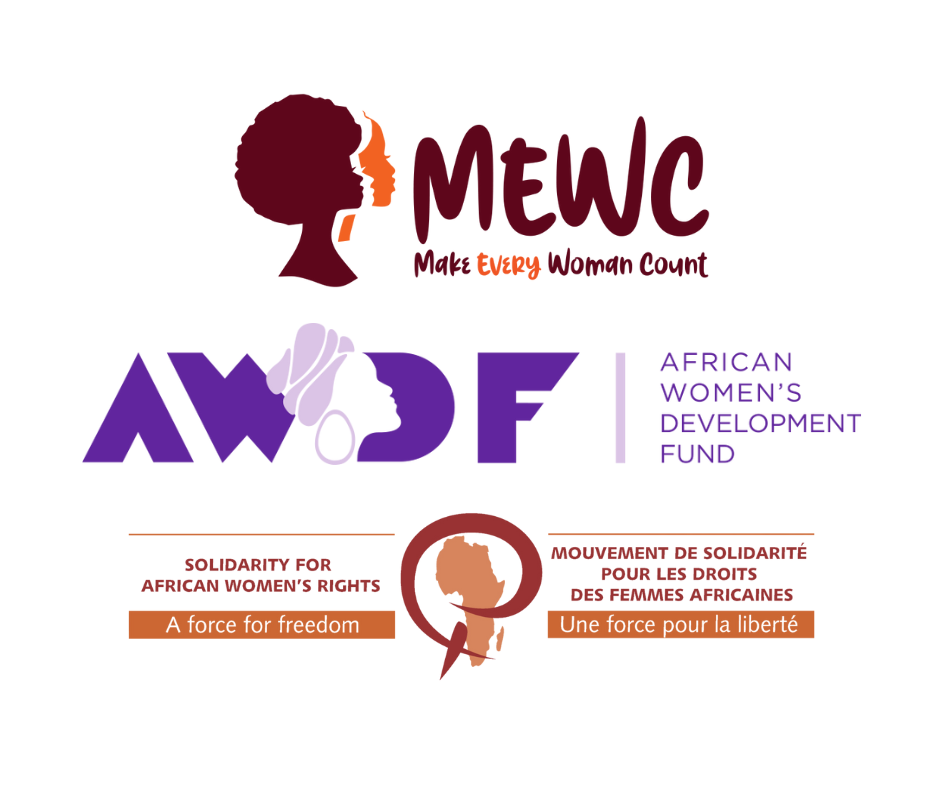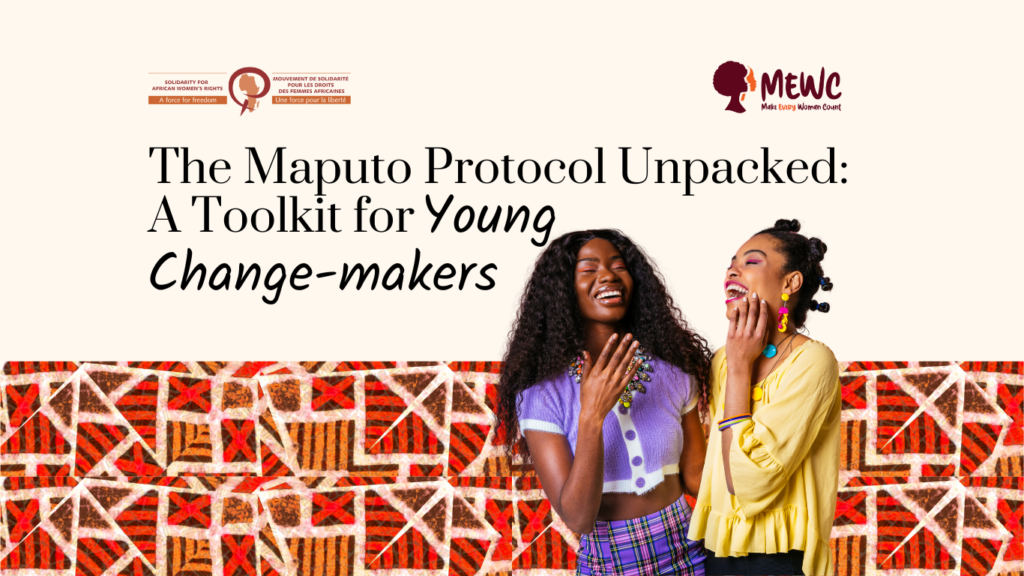This toolkit on the Maputo Protocol is designed to help young Africans understand and engage with the most powerful legal instrument for women’s rights on the continent. It unpacks 10 key areas of the Protocol according to issues most pressing for Africa’s younger populations. Each topic is explored through factsheets that answer FAQs and envision a future where the Protocol is fully implemented, and through shareable content for your advocacy, such as a TikTok video and infographics.
These resources are designed to be concise and easily digestible. If you’re looking for even more information, check out SOAWR’s 20 Years of the Maputo Protocol: Where are we now? report.
Whether you’re an activist, student, content creator, or just curious about women’s rights in Africa, this toolkit is your introductory guide to learning, advocating, and making change! We encourage you to use and share these resources widely; tag @SOAWR so we can amplify your message.
Download the toolkit or explore each topic individually below.
Let's Unpack the Maputo Protocol...
What is the Maputo Protocol?
@soawr.coalition What is the Maputo Protocol and how does it relate to you? Get started with this crash course and find out more at bit.ly/YoungAfricanChangeMakers #maputoprotocol #africanwomensrights #africanactivists #africanchangemakers #fyp ♬ Chill and gentle lo-fi/10 minutes(1455687) - nightbird_bgm
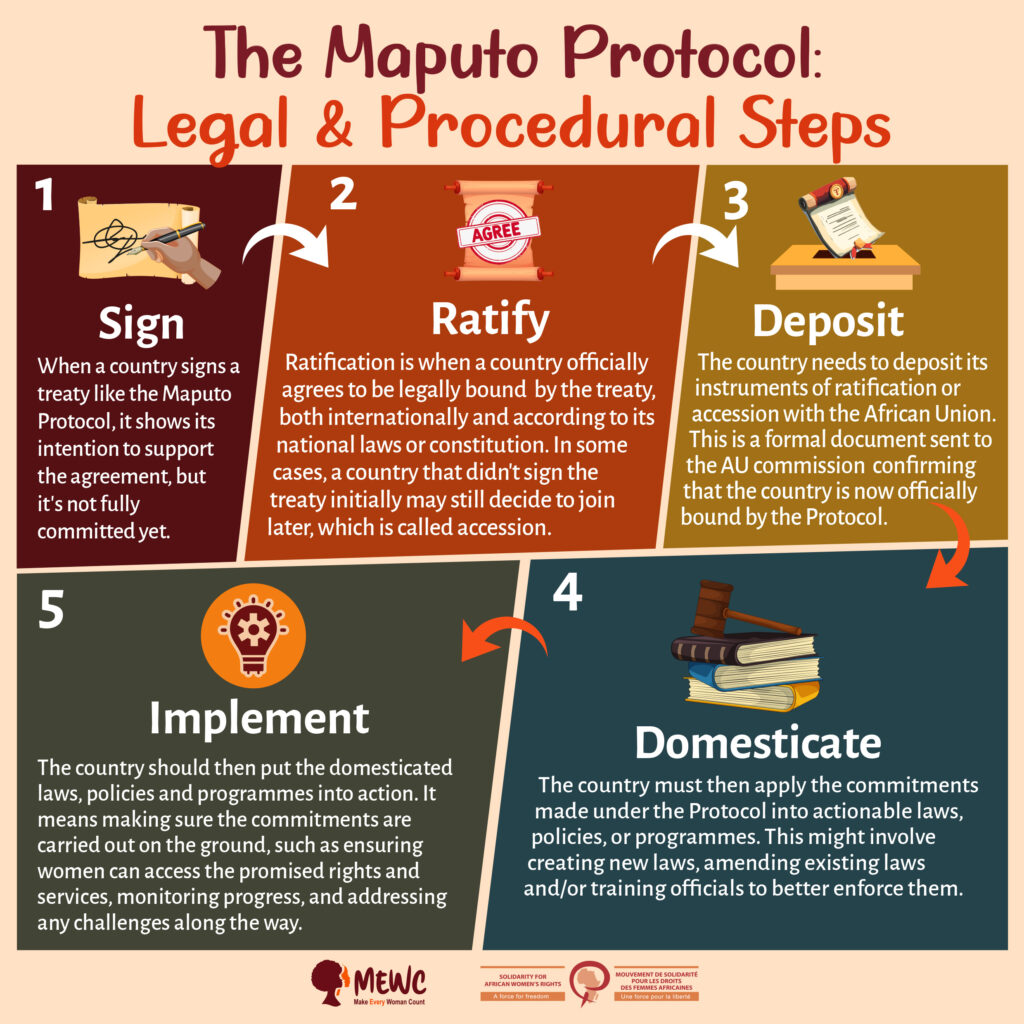
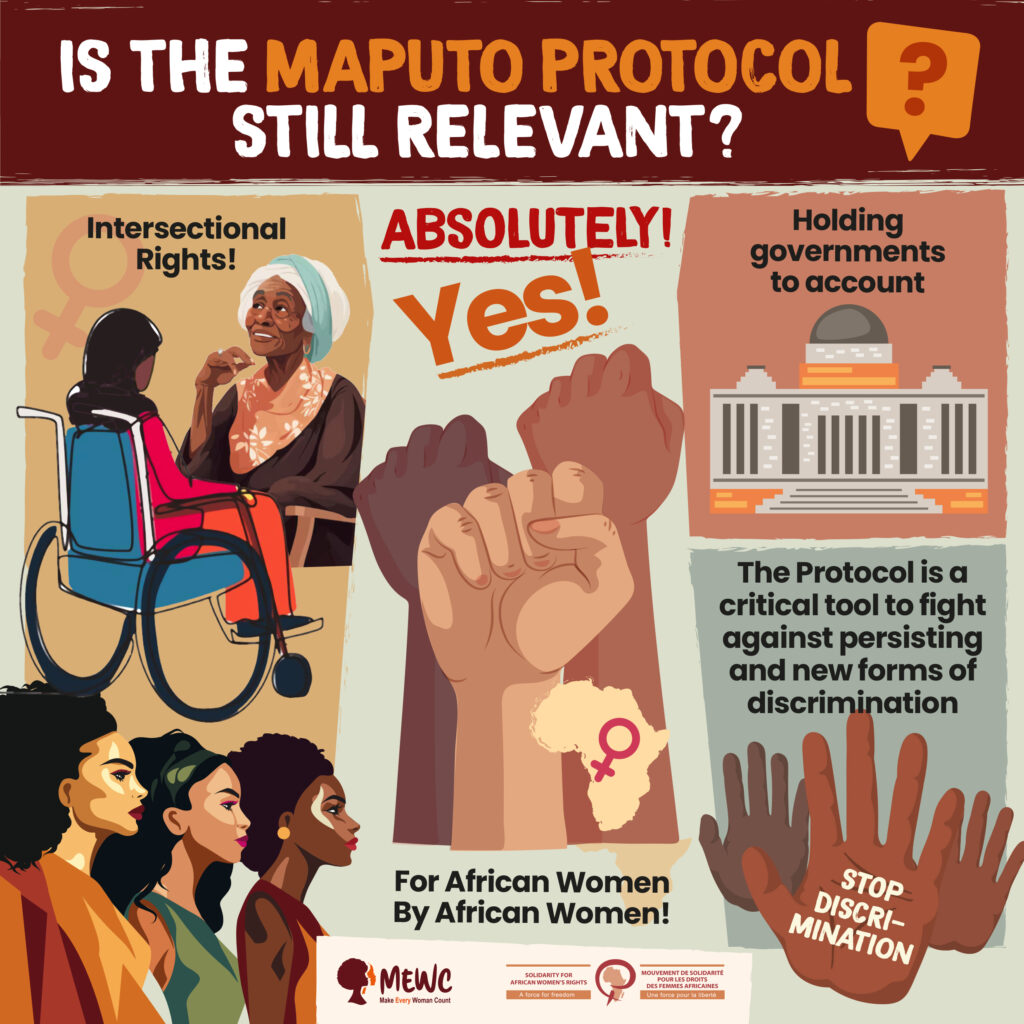
@capitalfmkenya As International Women’s Day draws near, we want to remind you about the most progressive international instrument that focuses on the rights and protection of women and girls, The Maputo Protocol 🌍 #MaputoAt20 #IWD2024 #capitalfmkenya ♬ original sound - Capital FM Kenya
What does the Maputo Protocol say about...
Climate and Sustainability
Use these infographics to highlight the persisting challenges, as well as imagining a future where the rights of Article 18 are fully implemented.
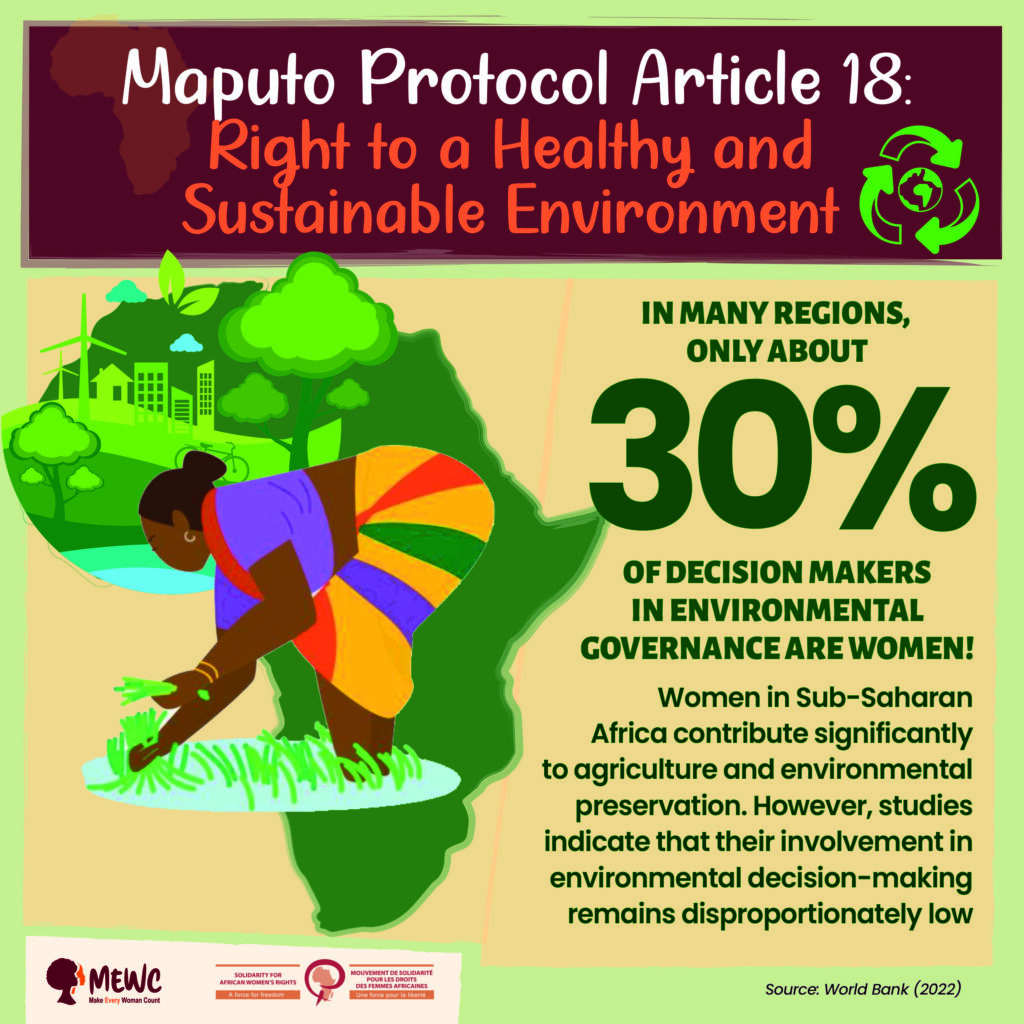
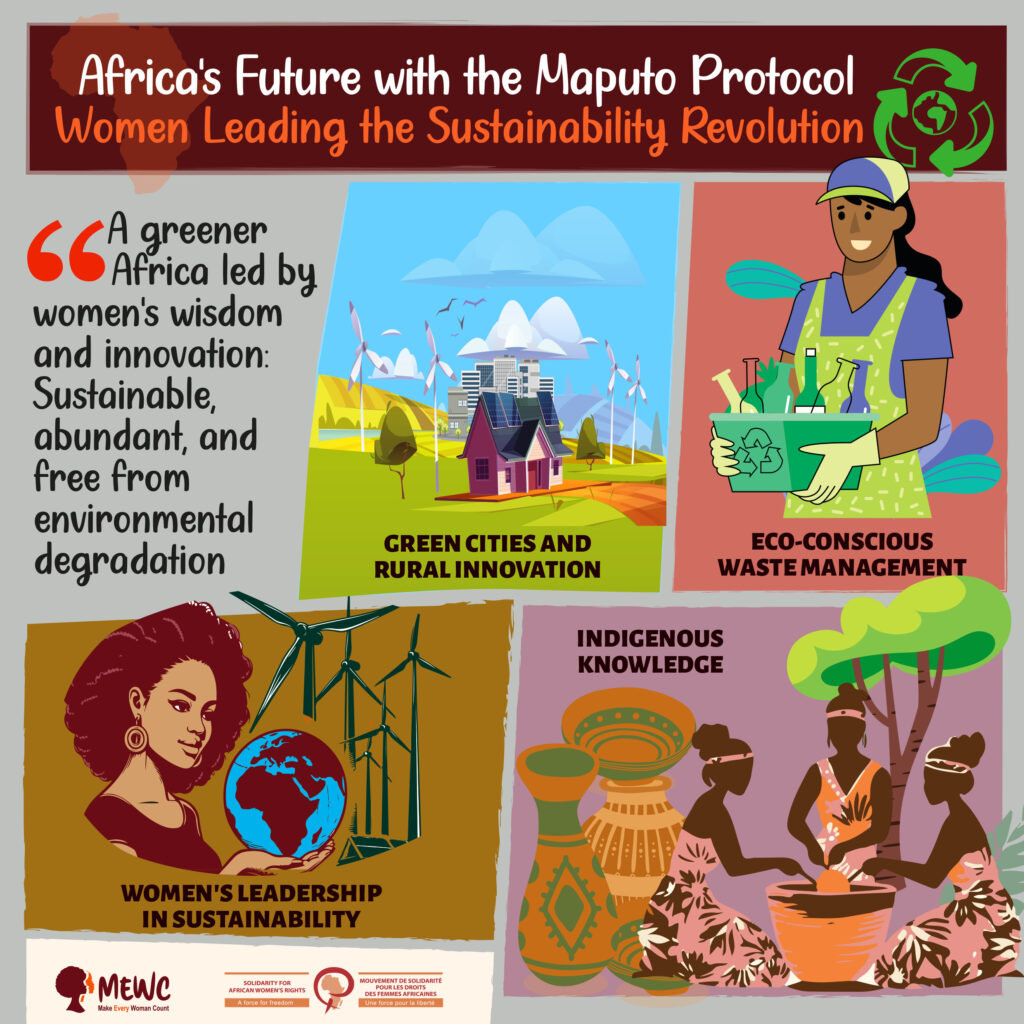
@oxfam.south.afric What does a #FeministFuture look like to you? #AfricanFeminists #FeministFellows #TheFutureIsFeminist #TheFutureIsEqual #FeministFellowshipProgramme @mazaza065 ♬ original sound - Oxfam South Africa
Where can I learn more and how can I get engaged in the Maputo Protocol & Climate and Sustainability rights?
- Connect with SOAWR member organisation FEMNET & their annual African Feminist Academy for Climate Justice. FEMNET is also a member of the African Activists for Climate Justice (AACJ) Project whose goal is a powerful and lasting climate action footprint.
- Join the Power to Voices digital platform, empowering social justice advocates across Africa. This secure alternative to mainstream social media shields activists from censorship, fostering networking, campaign support, and knowledge sharing; download the Android or Apple app.
- Women’s Environment and Development Organisation (WEDO): WEDO collaborates with African organisations to integrate gender into climate policy and practices. You can join their Feminist Action Nexus for Economic and Climate Justice (“Action Nexus”) which aims to advance a comprehensive feminist agenda at the nexus of climate and economic justice towards regenerative economies that centre care for people and planet.
- Become a member of Pan-African Climate Justice Alliance (PACJA): PACJA champions climate justice across the continent and has initiatives aimed at mainstreaming gender in climate advocacy.
- African Youth Initiative on Climate Change (AYICC): AYICC engages young people to link climate change and poverty reduction targets, especially in terms of utilising appropriate and ecologically viable strategies.
- GenderCC – Women for Climate Justice: An international network with active African chapters, working on gender and climate issues by engaging in policy, research, and grassroots mobilisation.
- WoMin African Alliance is Pan African ecofeminist alliance which works alongside organisations of women, peasants, and communities impacted by extractive developments. They make visible and publicise the impacts of extractivism on peasant and working-class African women and support women’s organising, movement-building and solidarity.
- Follow and engage on social media via #FeministClimateJustice
Economic Rights
@capitalfmkenya Have you or anyone you know ever been compelled to resign from a job or faced unfair treatment due to pregnancy? Article 13 of the Maputo Protocol guarantees women equal opportunity to economic and social protection like being protected from discrimination based on pregnancy. #MaputoStreetPodcast #InspireInclusion ♬ original sound - Capital FM Kenya
Use these infographics to highlight the persisting challenges, as well as imagining a future where the rights of Article 13 are fully implemented.
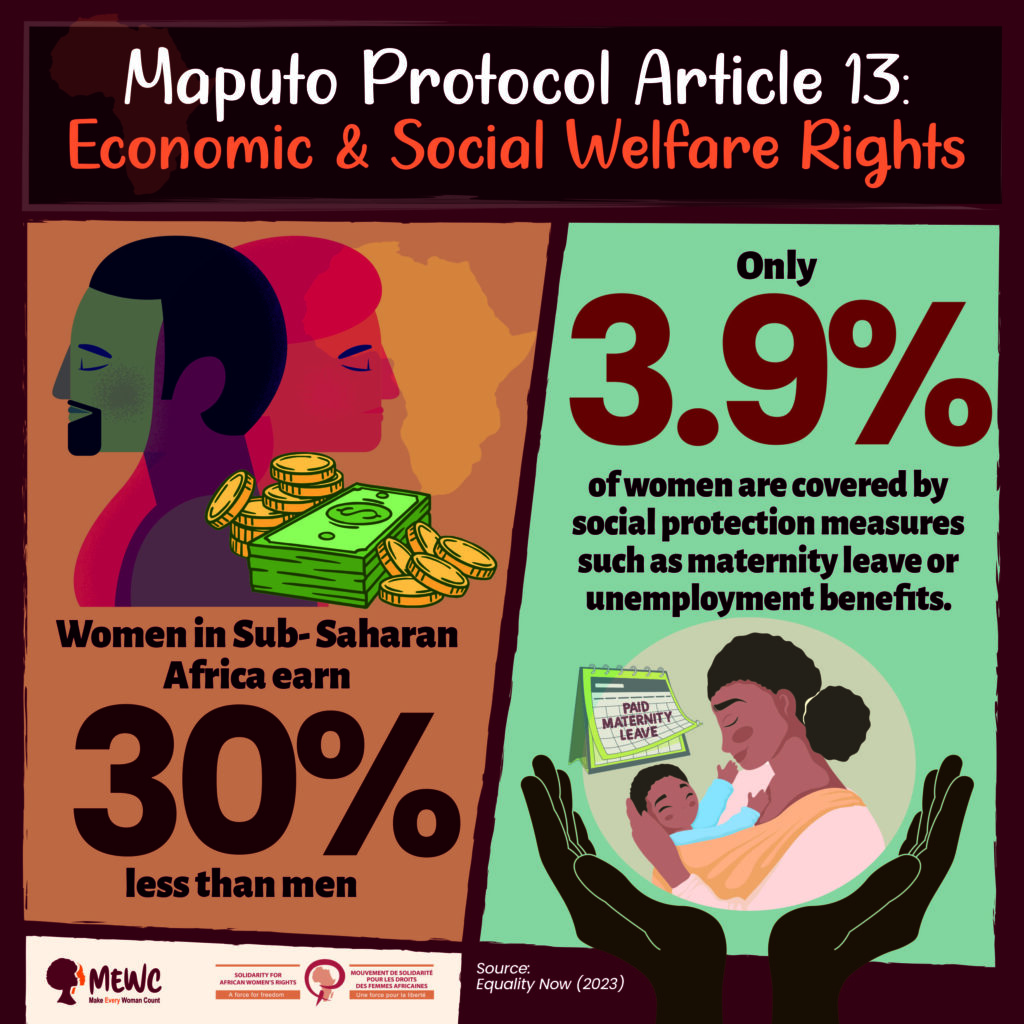
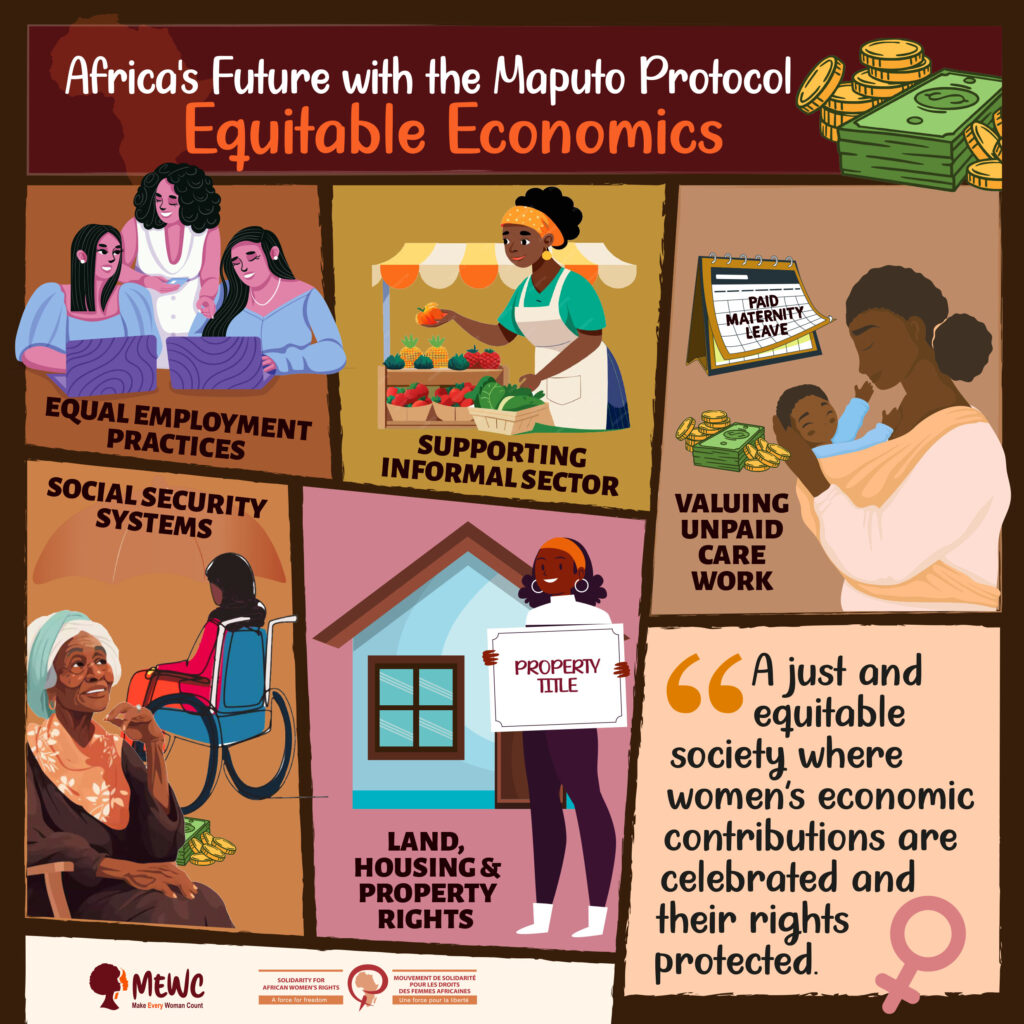
Where can I learn more and how can I get engaged in the Maputo Protocol & Women’s Economic Rights?
- SOAWR member Akina Mama wa Afrika (AMwA) challenges neoliberal economic models and addresses the precarious and yet often ignored connections between the climate crisis and economic and gender justice.
- SOAWR member the Coalition on Violence Against Women (COVAW) seek to strengthen women and girls’ position as key economic actors through greater and equal access and control over economic resources, opportunities and assets.
- Africa Youth Trust (AYT) – AYT focuses on advocating for youth economic rights, including creating opportunities for employment, entrepreneurship, and access to finance. They promote youth-led economic policies and seek to bridge the gender gap in economic participation.
- The Nawi – Afrifem Macroeconomics Collective (Nawi Collective) is a Pan-African Feminist initiative of feminist activists and organisations that are challenging the current macro-level economic policy of governments, reframing gender equality away from building the capacity of individual women, towards challenging the systems and structures that perpetuate this inequality. Their Djali Podcast interrogates how to re-imagine a future that is inclusive and just using a Pan African feminist approach.
- The Tax Justice Network Africa (TJNA) challenges harmful tax policies and practices that on one hand facilitate illicit resource outflows and on the other hand favour the wealthy while aggravating and perpetuating inequality.
- Learn more about the Africa Continental Free Trade Area (AfCFTA) and the upcoming Protocol on Women and Youth in Trade Africa via Trade Unions and Trade in Africa.
Political Participation
Use these infographics to highlight the persisting challenges, as well as imagining a future where the rights of Article 9 are fully implemented.
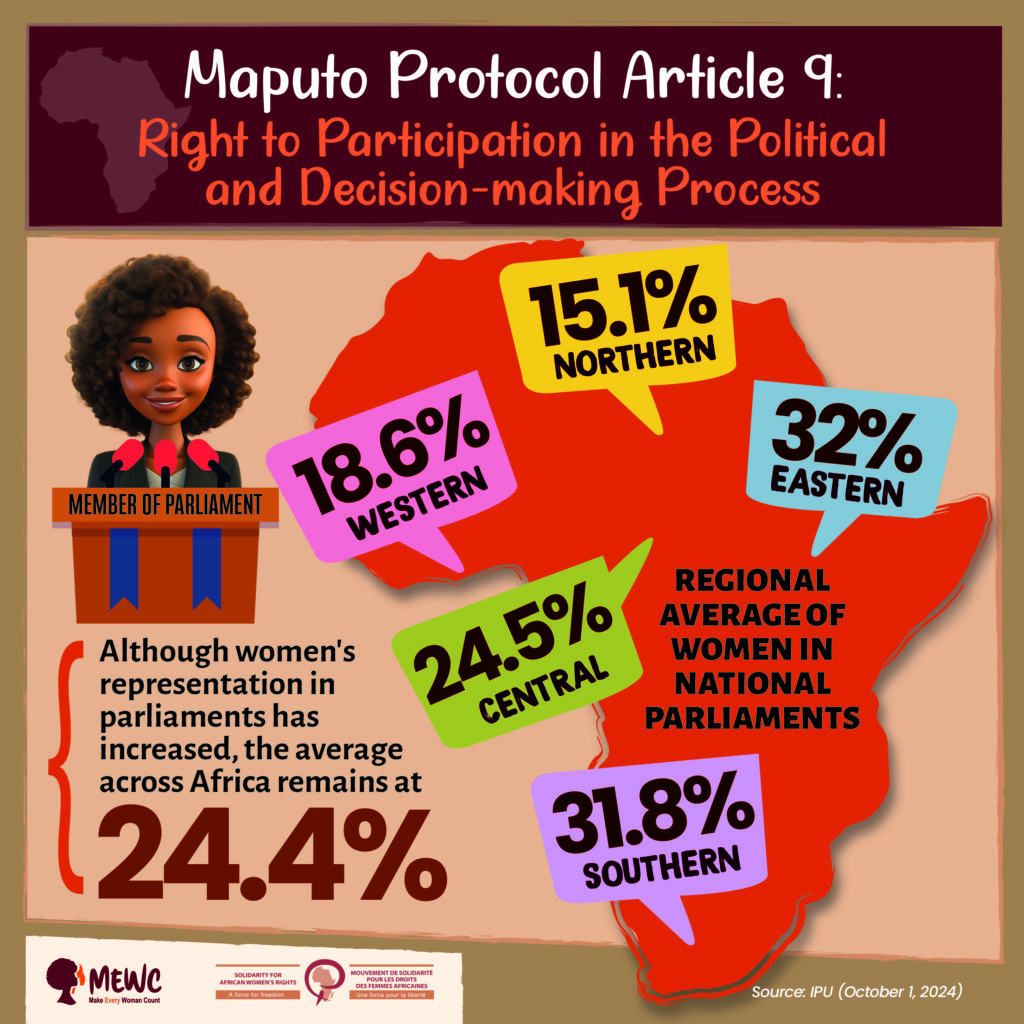
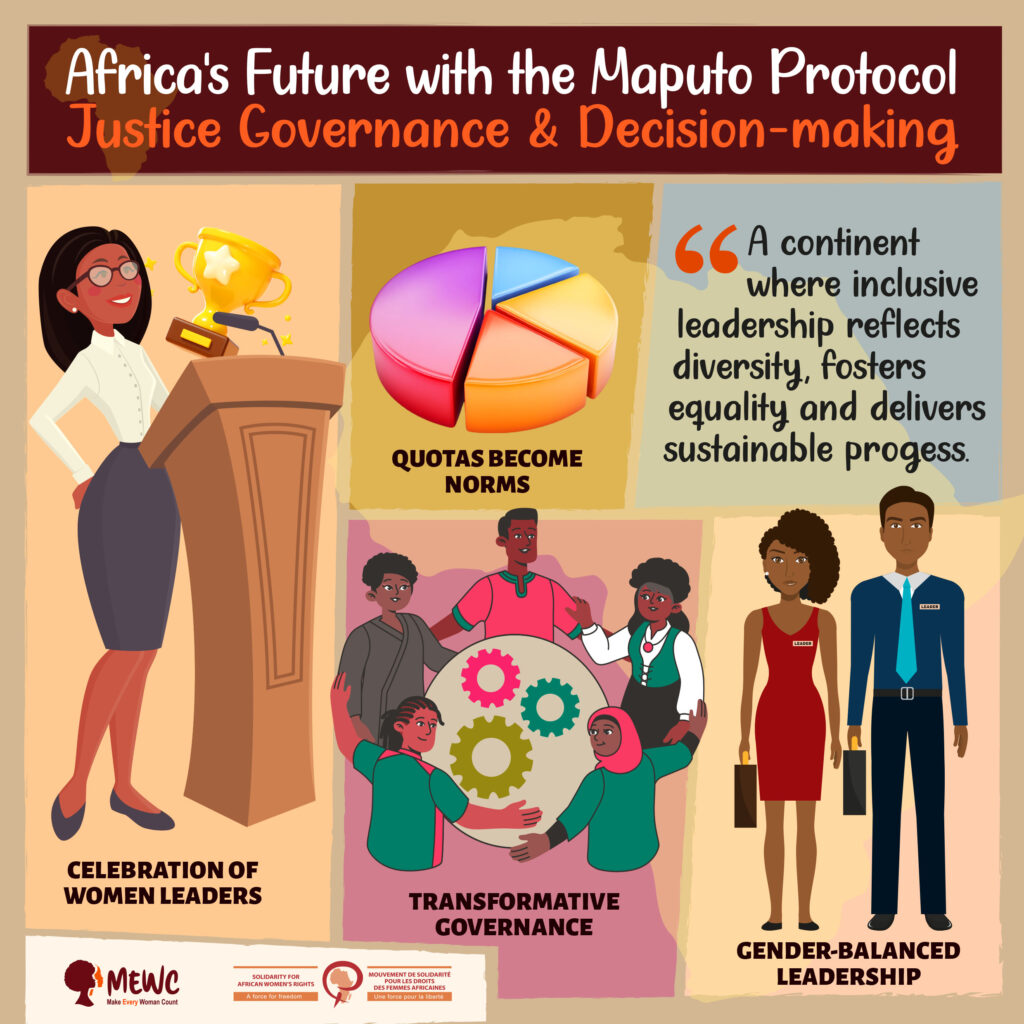
Where can I learn more and how can I get engaged in the Maputo Protocol & Political Participation?
The Women in Political Participation (WPP) project is a Pan-African gender project on the different facets of Women and Politics in Africa, involving a number of SOAWR’s member organisations. Its aim is to contribute to advancing the goal of gender equality in politics and governance, in line with the Maputo Protocol; various associated sub-regional protocols and standards, and the United Nations Sustainable Development Goals (SDGs).
SOAWR member Make Every Woman Count (MEWC) monitors every election around Africa and publishes analysis which focuses on women’s political participation.
- WILDAF (Women in Law and Development in Africa) focuses on enhancing women’s participation in political and decision-making spaces in West Africa through legal empowerment, policy advocacy, and political training.
The African Women Leaders Network (AWLN), initiated by the African Union Commission, is a vibrant network of accomplished women leaders with outstanding trails in the political, business, academia, science, community and general leadership arenas, as well as a pool of accomplished, talented, innovative young leaders and professionals, with notable achievements, striving to reach their leadership potential and be impactful. Through a social network, AWLN Mentorship envisions to foster an exchange of intergenerational views, skills and knowledge amongst network members and beyond to. Find out more on how you can either become an AWLN Mentor or Mentee by emailing [email protected]
Women, Peace & Security
Use these infographics to highlight the persisting challenges, as well as imagining a future where the rights of Articles 10 & 11 are fully implemented.
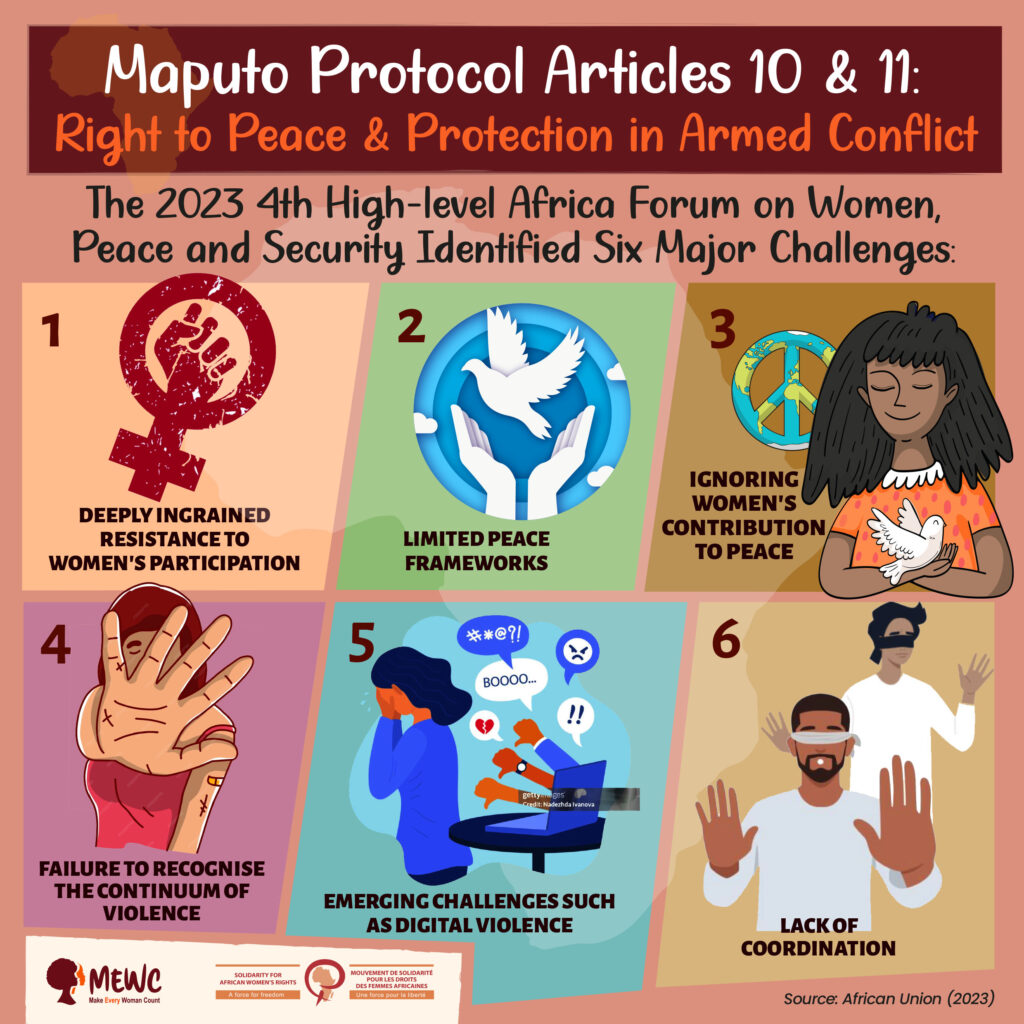
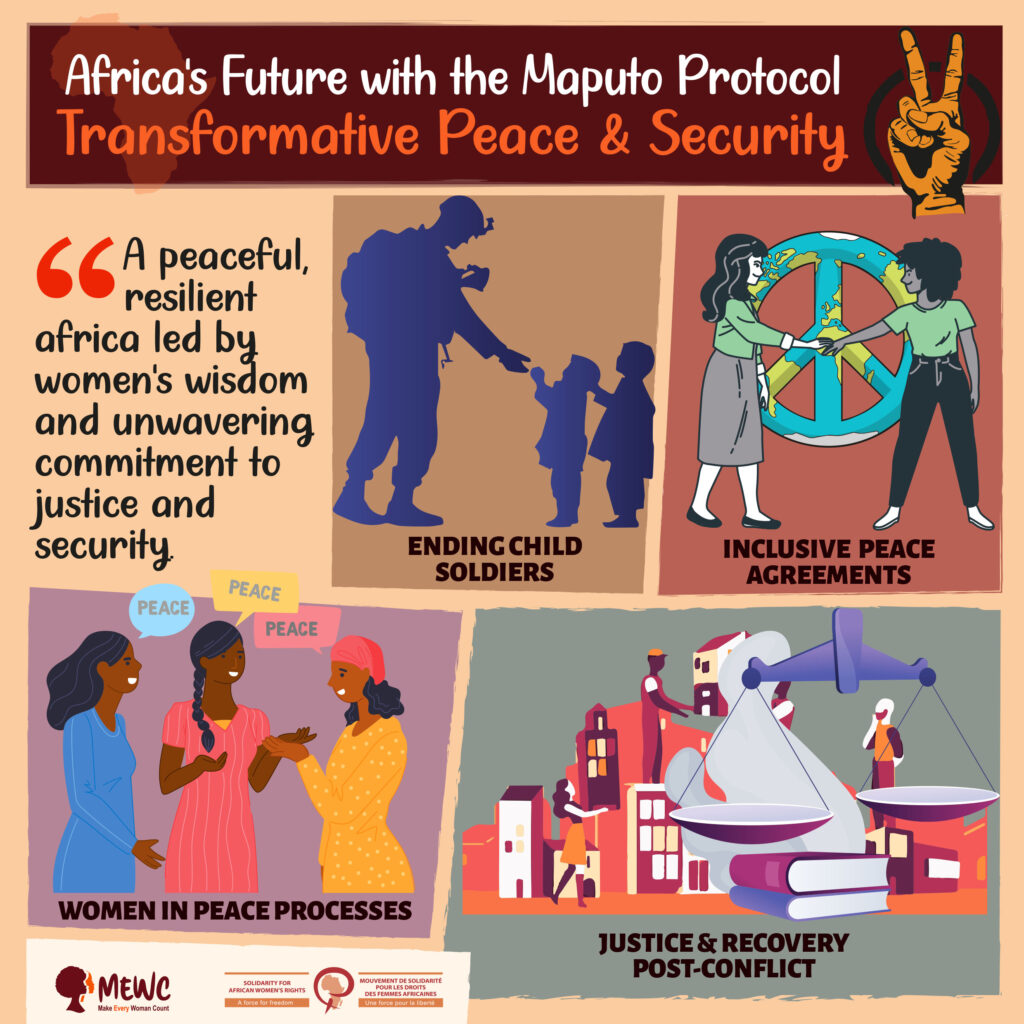
@nalafem “Men with guns fear women who make peace” - Leymah Gbowee There is no peace without women! Stand in solidarity with the women of Sudan as they fight to silence the guns in their country🇸🇩🇸🇩 Sign the petition:bit.ly/sudanceasefire #SudanIsBleeding ♬ original sound - nalafem
Where can I learn more and how can I get engaged in the Maputo Protocol & Women, Peace & Security?
- SheLeads for Peace – A youth-led initiative empowering young women in Africa to engage in peacebuilding and conflict resolution.
- African Union’s FemWise-Africa – A network that strengthens the role of young African women in peacebuilding and mediation.
- WPS Youth Network – A global youth-led platform advocating for gender-sensitive peace and security policies, including in Africa.
- Peace First Africa – A platform supporting young African changemakers with mentorship and funding to lead peace initiatives.
- UNOY Peacebuilders – A youth-led network supporting young Africans in conflict prevention and peacebuilding.
- Peace Exchange Podcast – A podcast featuring young African activists discussing peacebuilding and conflict resolution.
- Silencing the Guns Initiative – The African Union’s campaign to promote youth-driven solutions for conflict prevention.
Sexual & Reproductive Health Rights (SRHR)
@capitalfmkenya On the Maputo Street Podcast, we tackled the topic of Abortion. The Maputo Protocol champions a woman's right to choose, empowering her with control over her own body. Let's amplify this message of autonomy and celebrate the power of choice. #MaputoStreetPodcast #IWD2024 #CapitalFMkenya ♬ original sound - Capital FM Kenya
Use these infographics to highlight the persisting challenges, as well as imagining a future where the rights of Article 14 are fully implemented.
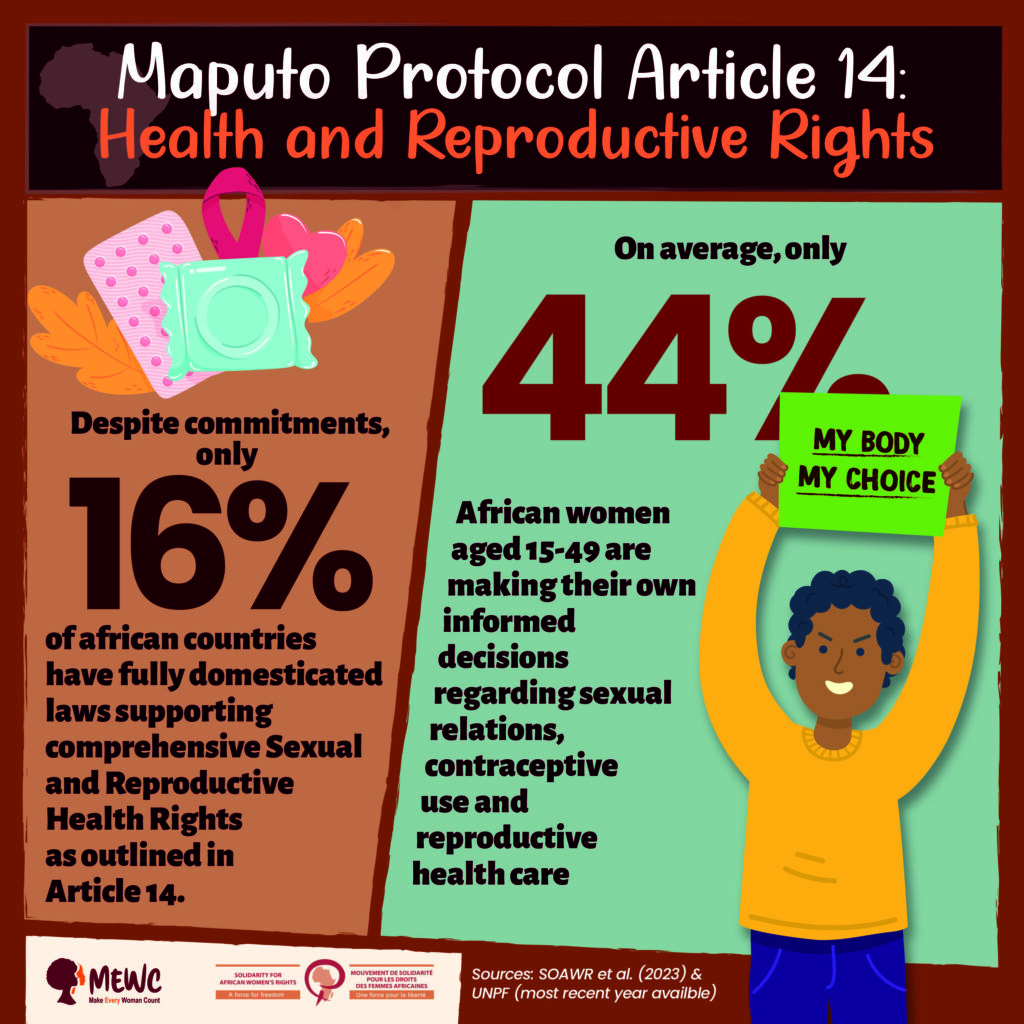
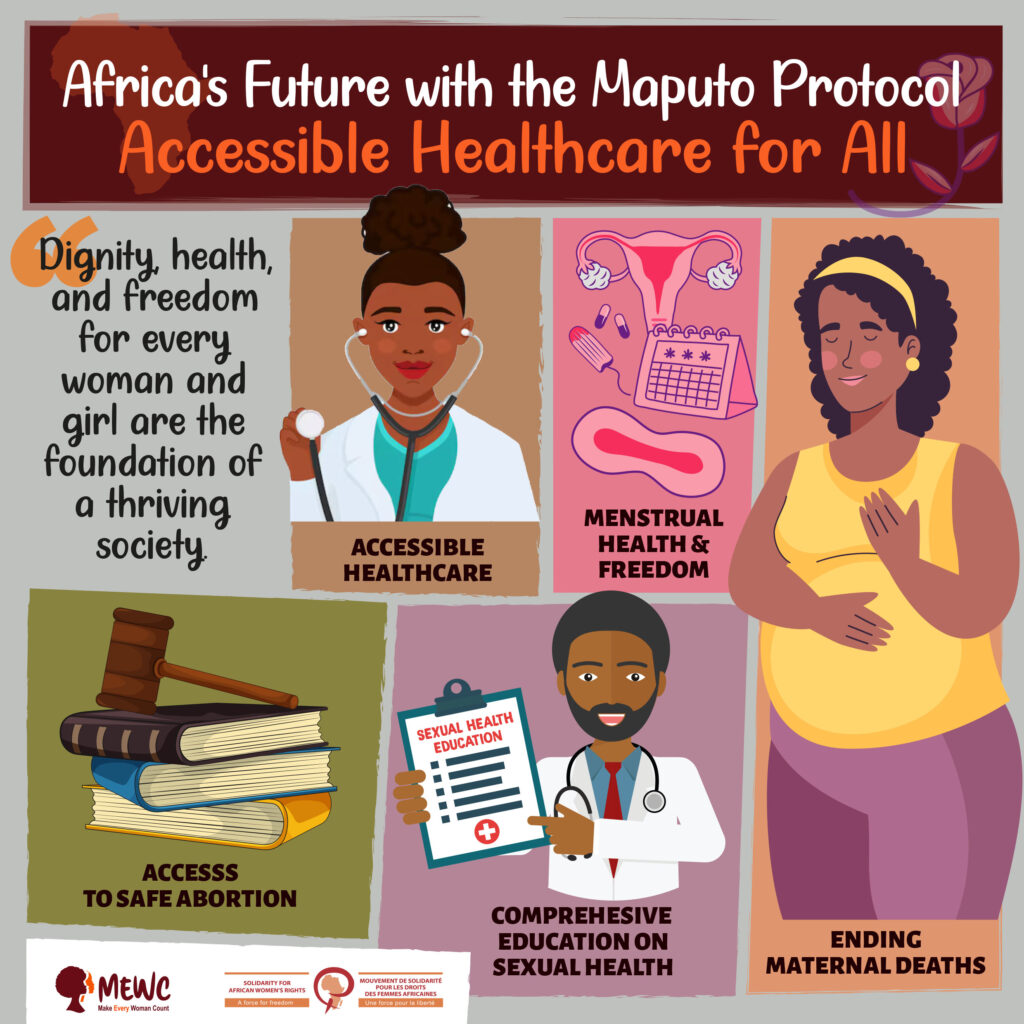
@fosfeminista 🌍 Celebrating 20 years of the Maputo Protocol! 🎉 #MaputoAt20 #feminist #africa #abortion #health ♬ original sound - Fòs Feminista
Where can I learn more and how can I get engaged in the Maputo Protocol & SRHR?
- African Youth and Adolescents Network on Population and Development (AfriYAN) – A youth-led network advocating for SRHR policies in Africa.
- SOAWR member organisation Centre for Reproductive Rights – Africa works with a network of partners, lawyers and activists, and through courts and regional human rights mechanisms, to ensure all people can realize their reproductive and human rights—especially marginalized groups that face numerous obstacles to accessing health care and justice. The Center further works to strengthen the region’s sexual and reproductive rights movement through capacity building and creating spaces for solidarity, sharing and collaboration among diverse stakeholders.
- SRHR Africa Trust (SAT) – Provides youth-friendly SRHR services and education.
- My Body, My Future App – An interactive app by IPPF Africa providing SRHR information to African youth.
- Love Matters Africa – A youth-friendly blog and platform discussing relationships, sexual health, and rights.
- UNFPA Youth Leaders Fellowship – A programme for young leaders in Africa to engage in reproductive health advocacy.
- SRHR Conversations Podcast – Discussions on youth, reproductive health, and rights in Africa.
- #WeLead Project – A youth-driven SRHR initiative focusing on marginalised groups, including young women.
Violence Against Women and Girls (VAWG)
Use these infographics to highlight the persisting challenges, as well as imagining a future where the rights of Article 4 are fully implemented.
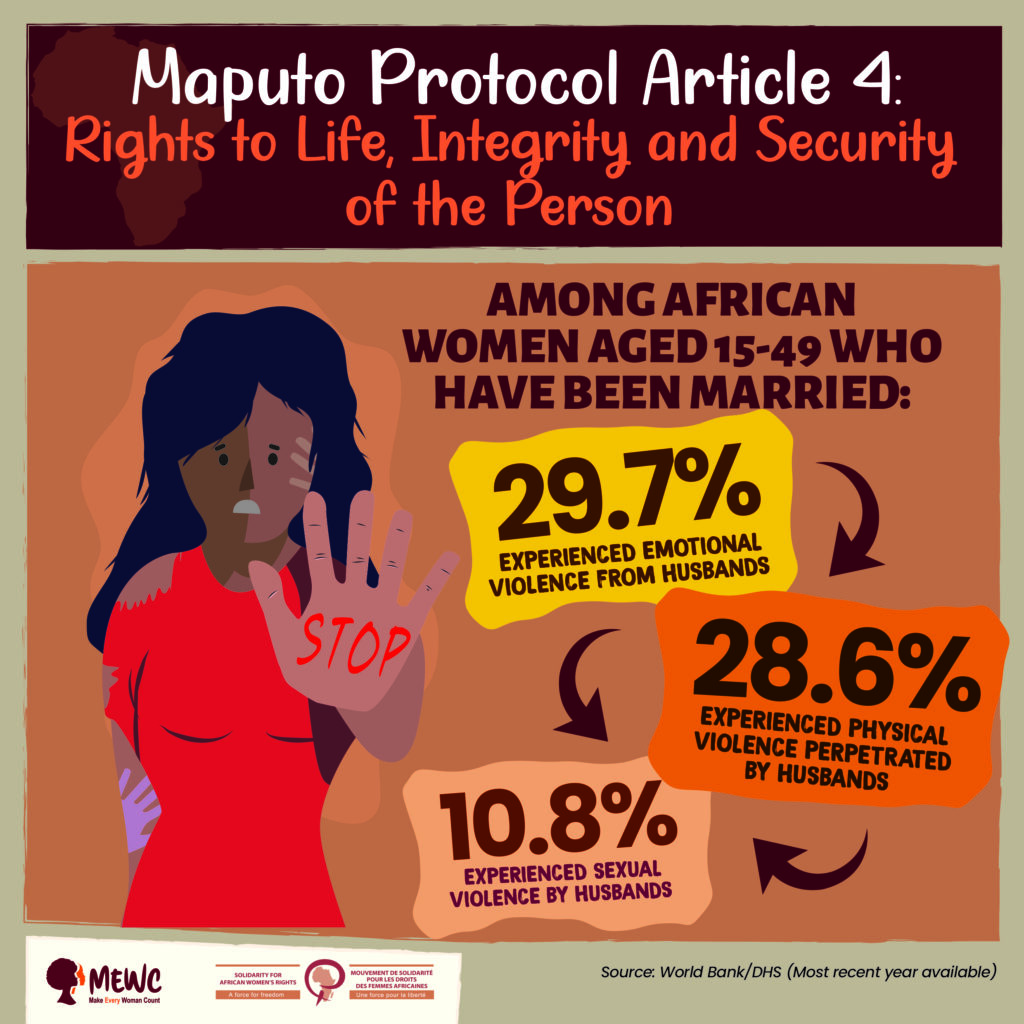
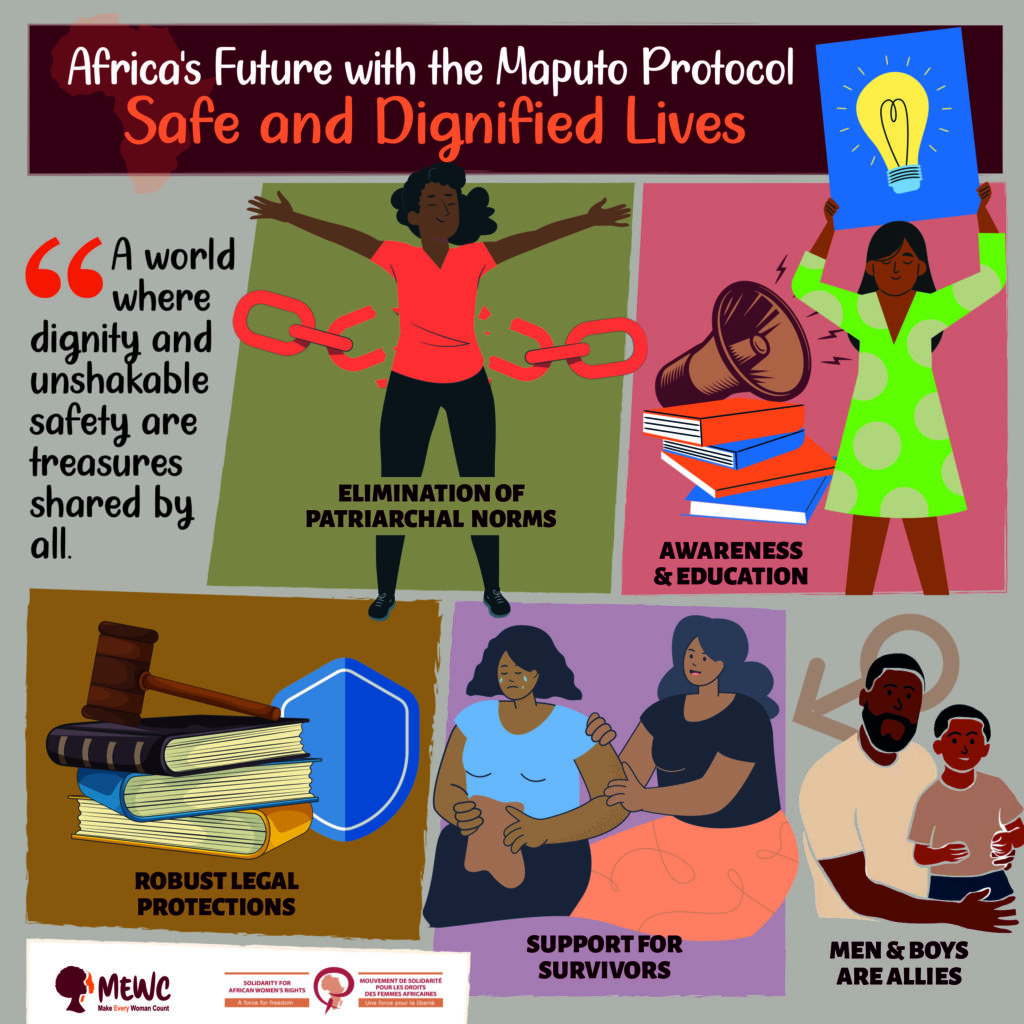
@picture__guru My guy @Kaye and I took to the streets yesterday in solidarity with our mothers and sisters- women in Kenya. A peaceful march protest the brutal murders of Kenyan women. A plea to end Femicide. We made this short film to help create awareness and in a desperate plea to help end Femicide in Kenya. #endfemicideke #endfemicide #standwithwomen #fightforwomensrights ♬ original sound - Braxton Peter
Where can I learn more and how can I get engaged in the Maputo Protocol & ending VAWG?
- Umoja Generation – A youth-led organisation fighting gender-based violence in African communities.
- Equality Now Africa – Advocates for ending VAWG through legal reforms and youth engagement.
- SHE SOARS Project – A youth-focused initiative addressing gender-based violence and sexual rights.
- Say NO – UNiTE – A UN campaign with youth-driven strategies to combat gender-based violence.
- Shaping Feminist Futures Podcast – Conversations on young African feminists challenging gender-based violence.
- The Consent Workshop – A youth-led initiative focused on educating African communities about consent and sexual violence.
- End GBV Africa Conference – A space for young African activists to engage in solutions to end gender-based violence.
Harmful Practices
Use these infographics to highlight the persisting challenges, as well as imagining a future where the rights of Article 5 are fully implemented.
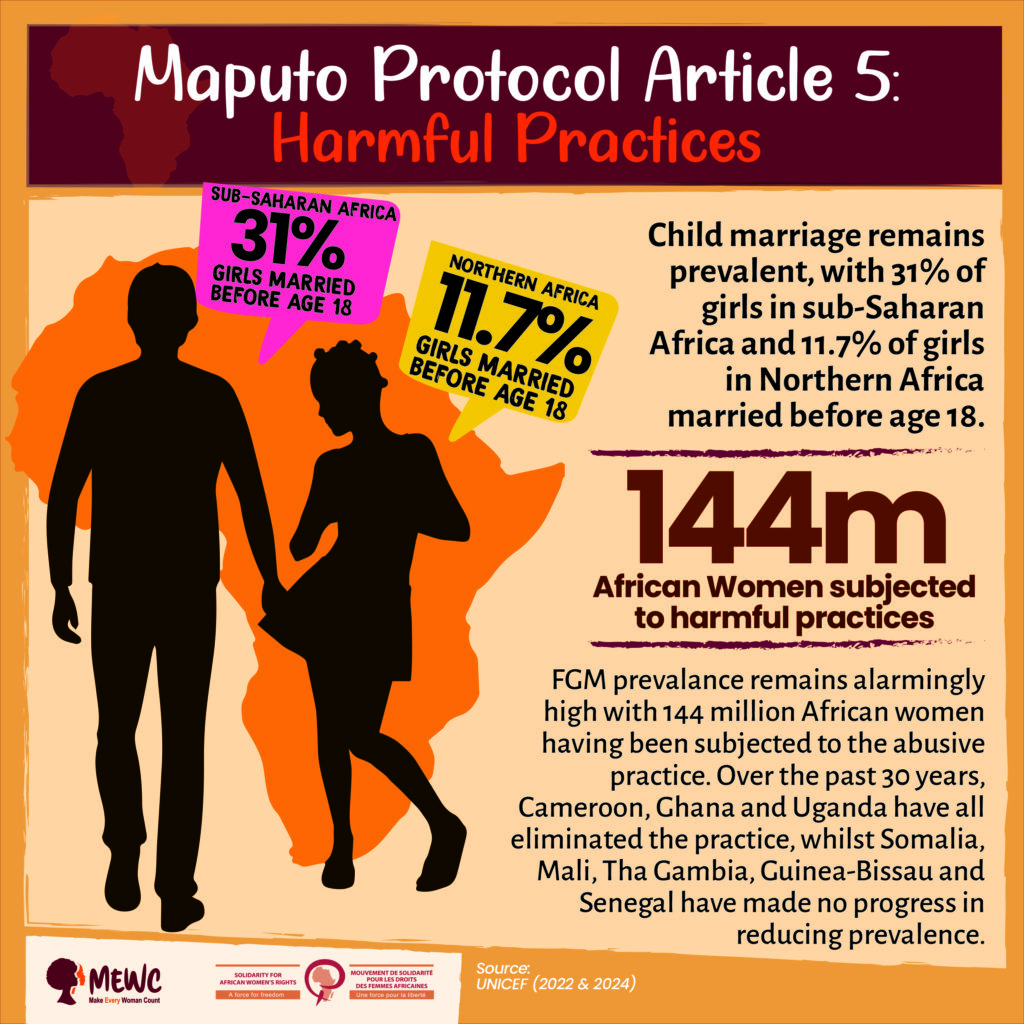
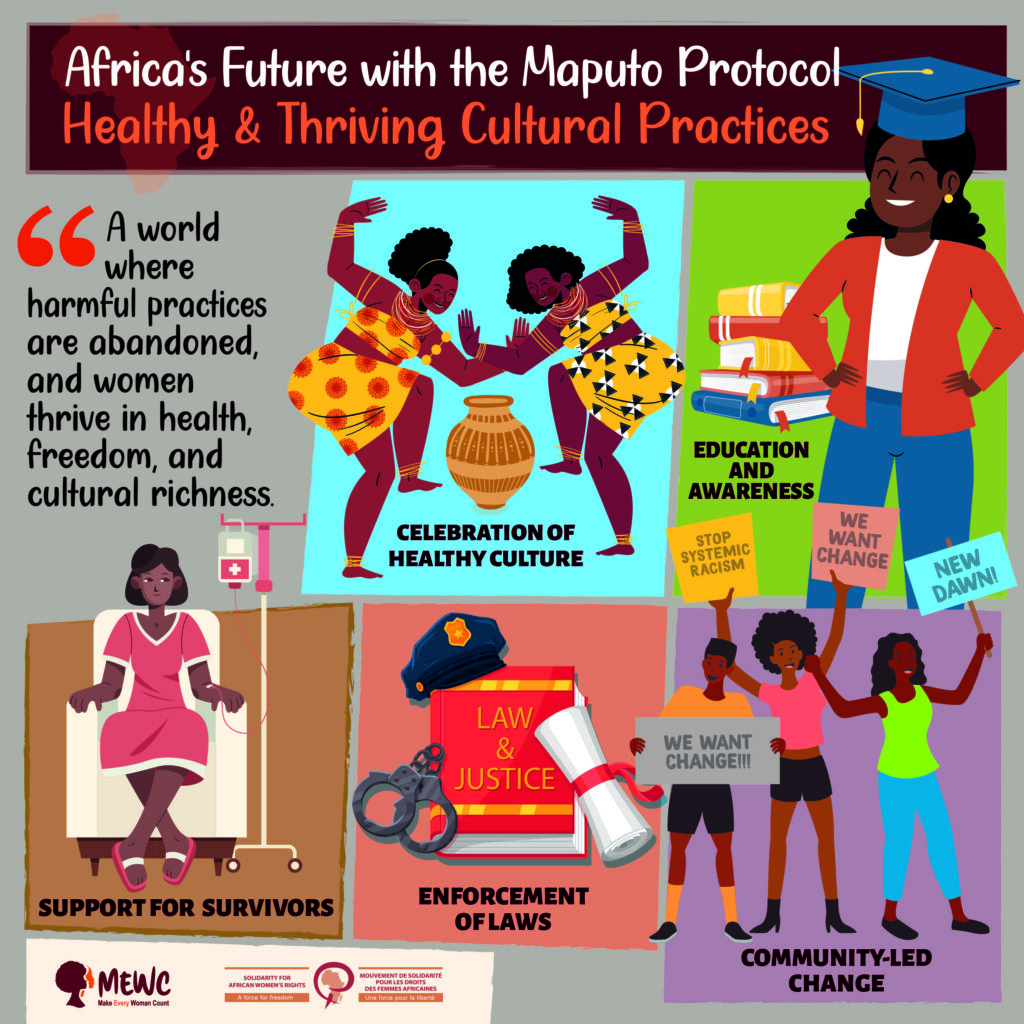
@visionaryafricans It’s very hard to talk about feminism in African spaces. After colorism, and ethnic rivalry, gender wars are a social issue that deeply affect African peoples. Whether it’s Black Americans arguing about the role of men and women to violence against women in South Africa, africans throughout the world face issues with women. In my opinion, we need more female representation in government and key institutions. We need to change how we view the role of women. That doesn’t mean we copy western feminism but we need to elevate women from being a second class citizen. - #nigeria #arewa_tiktok #yoruba #igbo #nigeriantiktok #hausa #presidentialelection #nigeriaelection #peterobi #tinubu #westafrica #blackculture #blackhistory #panafricanism ♬ son original - Visionary Africans
Where can I learn more and how can I get engaged in the Maputo Protocol & ending Harmful Practices?
- The Girl Generation – A youth-driven campaign to end FGM in Africa.
- 28 Too Many – Provides research and resources for young activists working to end FGM.
- Orchid Project – Collaborates with African youth to advocate against harmful traditional practices.
- Youth for Change – A global youth network tackling child marriage and FGM.
- Her Story Podcast – Young African women share personal experiences of resisting harmful practices.
- Africa-led Movement to End FGM – A Pan-African initiative empowering young leaders to challenge harmful traditions.
- UNICEF’s Youth Advocacy Guide – A resource for youth working to end child marriage and FGM.
Equality under the Law
Use these infographics to highlight the persisting challenges, as well as imagining a future where the rights of Article 8 are fully implemented.
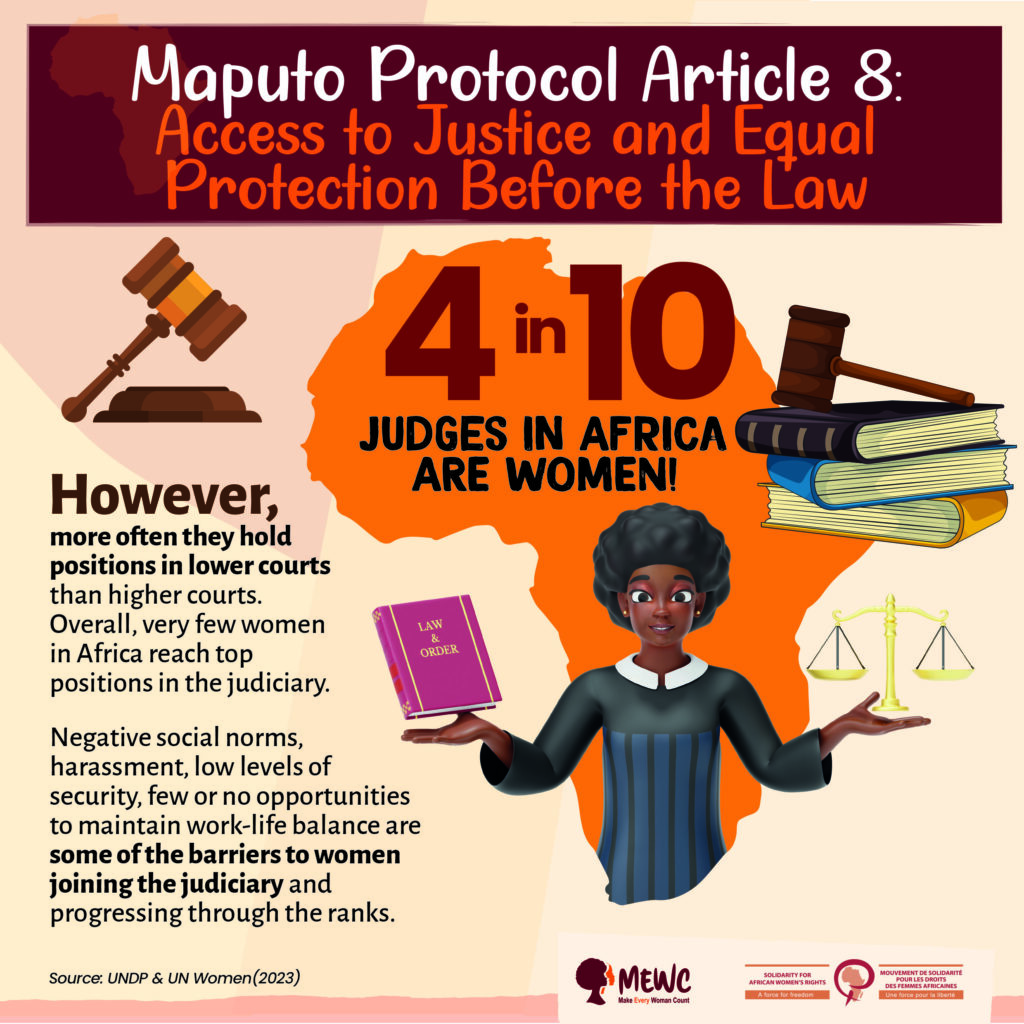
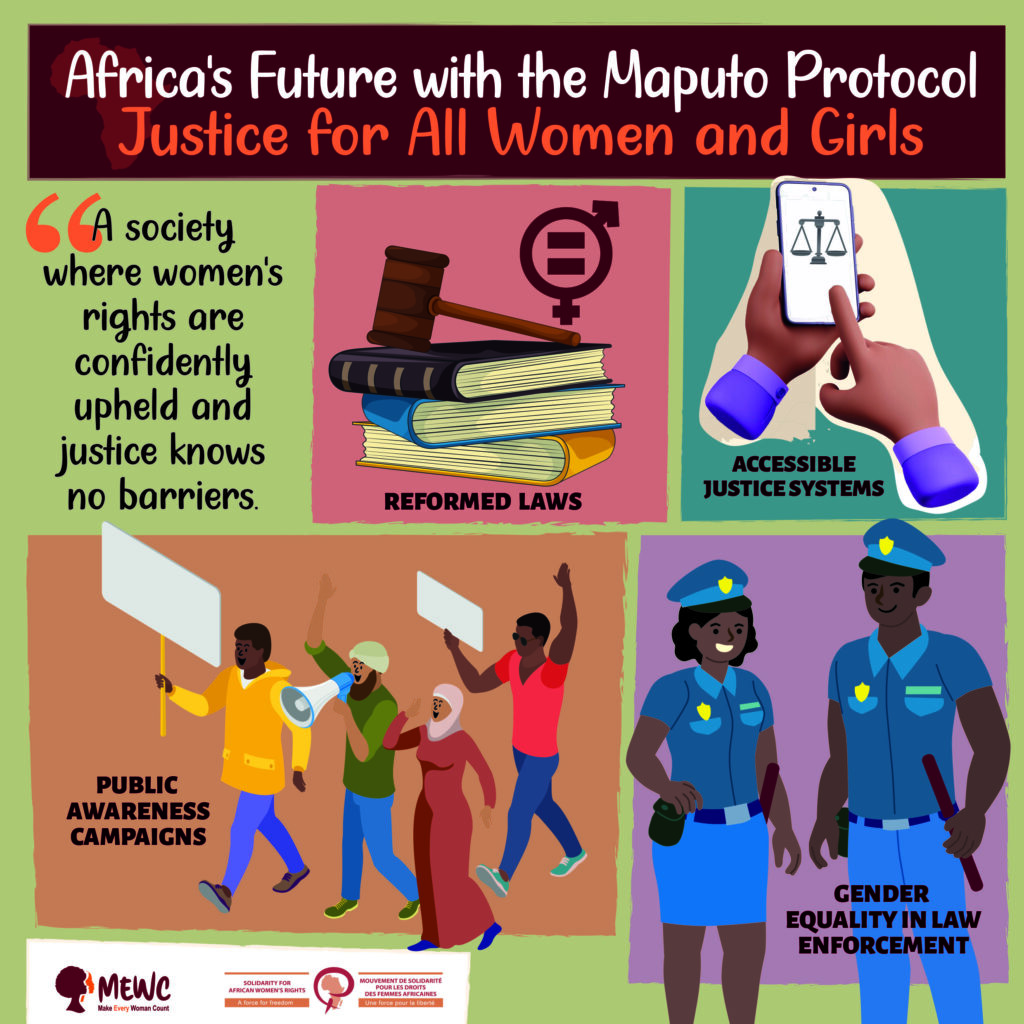
Where can I learn more and how can I get engaged in the Maputo Protocol & Equality under the Law?
- SOAWR Member Equality Now Africa works with partners across the region to hold governments accountable for protecting and promoting the rights of women and girls.
- Federation of Women Lawyers (FIDA) – Africa – Provides young women with legal support and training in human rights law.
- African Legal Information Institute (AfricanLII) – Offers free legal resources and databases for young African law students and activists.
- Lawyers for Human Rights – Africa – Engages young legal professionals in advancing women’s rights.
- AfricLaw Blog – A blog where young African legal scholars discuss gender equality and human rights.
- Youth Moot Court on Human Rights – A competition for young Africans to engage in human rights law.
- Feminist Legal Theory Podcast – Discusses African feminist legal approaches to gender equality.
Women with Disabilities
Use these infographics to highlight the persisting challenges, as well as imagining a future where the rights of Article 23 are fully implemented.
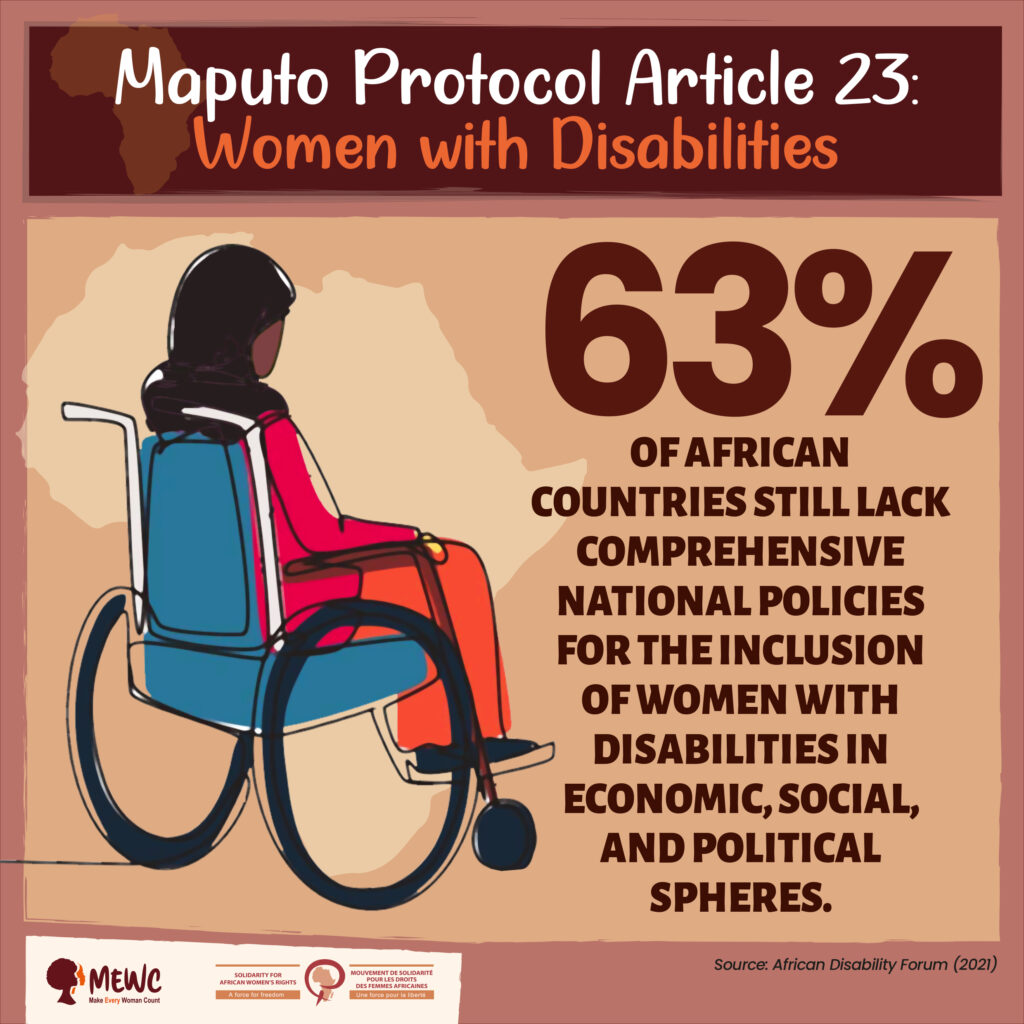
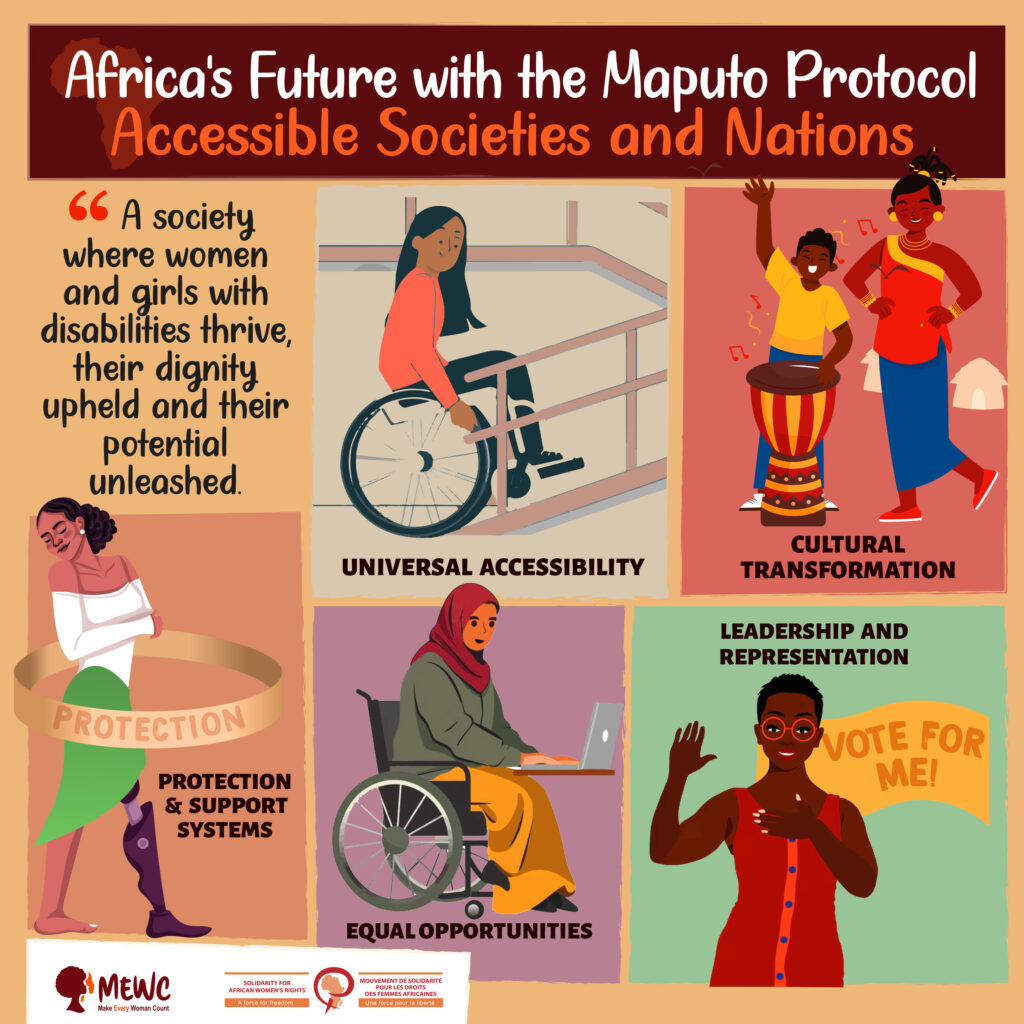
Where can I learn more and how can I get engaged in the Maputo Protocol & the rights of Women with Disabilities?
- Women with Disabilities Africa Network (WWDAN) – A Pan-African network empowering young women with disabilities.
- African Disability Forum (ADF) – A regional network advocating for disability rights, including young women.
- UNICEF’s Inclusive Education Toolkit – A youth-friendly guide to advocating for the rights of women with disabilities.
- Sightsavers’ Youth Network – A youth-led advocacy platform for disability rights in Africa.
- PurpleCode Collective – A feminist collective focusing on African women with disabilities.
- Disability & Development Podcast – Features discussions on disability rights activism in Africa.
- Inclusive Futures – A global initiative promoting economic and social inclusion for young women with disabilities in Africa.
@soulcitysa Discover the power of the Maputo Protocol in our 5-part limited series podcast. Learn how this comprehensive legal instrument is transforming women's rights in Africa. Please tune in and join us on this eye-opening journey. https://bit.ly/3EDUJYJ
♬ original sound - Soul City Institute
Acknowledgements
Make Every Woman Count (MEWC) would like to express our sincere gratitude to all those who have been instrumental in the development of this toolkit. We are immensely thankful to the MEWC team for their invaluable contributions. We extend our heartfelt thanks to the following individuals for their contributions and support in bringing this toolkit to fruition: Grace Marwa-Pattison, Naomi Ndifon, Vivian Nilsson – van Iperen, and Rainatou Sow. Particular thanks goes to Naomi for being the star of SOAWR’s first TikTok video.
Special appreciation goes to Dr Milcah Chokah for her comprehensive translation of the factsheets and infographics into French, and to Ms Samah Osman for her meticulous translation of the factsheets and infographics into Arabic.
Furthermore, we would like to express our deep gratitude to the African Women’s Development Fund for their invaluable support in the realisation of this toolkit. Thank you also to the Solidarity for African Women’s Rights (SOAWR) Coalition Regional Cluster member organisations for their coordination and unwavering support. Lastly, thank you to other TikTok creators featured here.
This toolkit was published by SOAWR on March 28, 2025.
